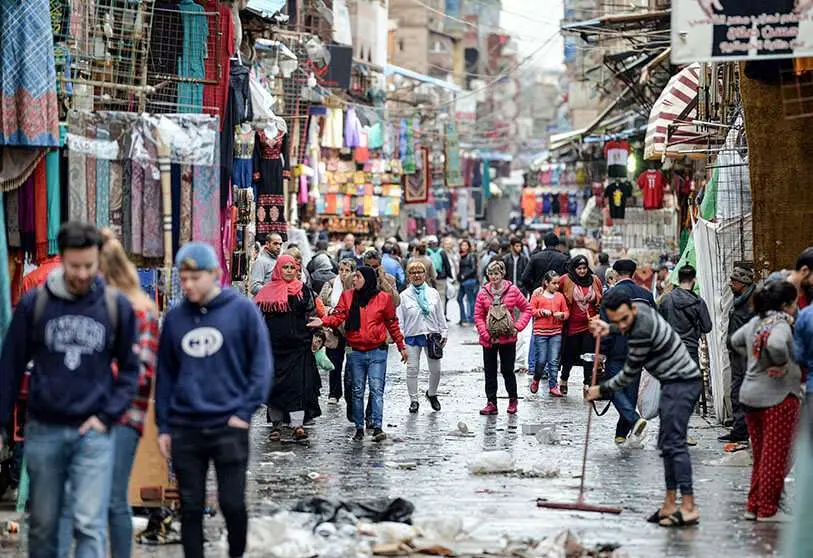Coronavirus hits Egypt's tourism sector

The coronavirus has swept away the recovery of tourism in Egypt. The fright of European tourists due to the political instability and the terrorist attacks of 2015 was beginning to come to an end. The country of the pharaohs received up to 45.7% more foreign visitors between January and May last year, according to the second quarter tourism outlook report by Exceltur, the Spanish tourism business organization. But the spread of the COVID-19 pandemic struck, and officials decided to suspend international flights from March 19 to April 15, with 366 cases and 19 deaths. The flood of travel cancellations from Europe reached almost 100%.
Everything pointed to positive times for tourism a few months ago. “Compared to three years ago, the number of queries for Egypt has increased by 143%,” explained Miguel Miranda, from the marketing team of the travel search engine Liligo, in October. “Competing destinations in the Eastern Mediterranean are recovering and slowing down the demand for sun and beach destinations, especially for the islands and the coast of Spain”, read the Exceltur study.

Since the outbreak of the Arab Spring in 2011, Egypt has suffered a decline in tourism from its record 14.7 million visitors in 2009. The change in trend began in 2016, when the arrival of foreigners grew by 55% to 8.3 million tourists. In 2018, the number of tourists visiting the land of the pharaohs was again above 11 million and the authorities had very optimistic forecasts for 2019 and 2020. In February alone, some 900,000 people visited Egypt, 4% more than in February of the previous year, according to the latest data provided by the Ministry of Tourism collected by the Efe agency.
Tourism has again collapsed just before Easter due to the spread of the coronavirus in the country, at the height of the high season for tourism in archaeological and historical sites, before temperatures rise. The Easter holidays, along with Christmas, represent between 10 and 15% of the annual turnover of the sector, according to Medhat Hammad, president of Promo Travel, in statements to the agency Efe. “Easter was very good this year and everything has been lost,” laments Hammad.

More than 11% of Egypt's GDP depends on tourism, so industry professionals stress how much of a blow it will be to the country's economy. “Egypt's economy is essentially dependent on tourism and is completely shut down by government measures. All reservations have been cancelled and all hotels are also closed,” says Ihab, an Egyptian guide who organizes tours in Spanish for Spanish-speaking visitors.
“It's been devastating, just like in the rest of the world, but here it's the livelihood of a lot of families. I hope the health crisis passes when it does because if it doesn't, the collapse of the economy is going to be just as devastating as the virus,” explains Marisa Lopez Chicote, a Spaniard living in Egypt who is in charge of events for the tour operator Galaxia Group, based in Egypt and the United Arab Emirates.

The famous Nile cruises have also been hit by the coronavirus. The first cases of the COVID-19 in the country were recorded on one of the ships sailing between the cities of Luxor and Aswan. Authorities randomly checked tourists and employees in the area for possible infection.
Occupation of these cruise ships has plummeted. In February it was 90% and in March it had plummeted to 10% due to the cancellation of flights and reservations, according to Efe agency.

The monumental complex of the pyramids of Giza has also been fumigated as a preventive measure in the archaeological and historical sites of the country. “We are taking advantage of the break to prepare the site for when tourism returns, we are cleaning everything up and restoring it,” explained the general director of the pyramids' archaeological zone, Ahraf Mohi, in statements collected by the newspaper El Mundo. The walls of the Abu Simbel and Karnak temples have also been disinfected, as well as a large part of the country's hotel complexes, the government announced on 18 March.
The work on the Great Egyptian Museum and the work on its restoration workshops has not stopped these days either, although they are working at half gas due to the preventive measures against the coronavirus, which has forced the postponement of the inauguration of the enormous complex that will exhibit Tutankhamen's treasure. The Minister of Antiquities and Tourism, Khaled Al Anani, has explained that the work is not stopping and the opening of the new complex has been postponed to 2021 - which in principle was scheduled for the end of 2020 - during a visit to the facilities on April 13.

Up to 1,700 workers, 300 engineers and representatives from 33 Egyptian companies are working to carry out at least 50% of the daily work, the Ministry of Antiquities and Tourism explained in a statement. Authorities had already anticipated in early April that the inauguration of the Great Egyptian Museum, which will be the largest archaeology museum in the world covering 480,000 square meters, and other national projects, would have to be postponed until 2021 due to the expansion of COVID-19.








